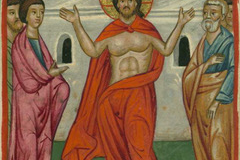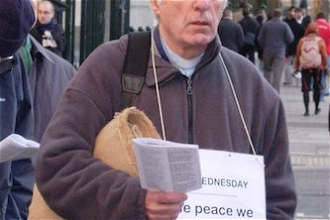Christians take part in worldwide climate change rallies
Christians of all denominations joined in rallies in more than 50 cities around the world, on Saturday, to appeal for world leaders at the UN Climate Talks in Bali, to respond effectively to the threat global warming. In London, an ecumenical prayer service took place at St Matthew's Church, Great Peter Street, Westminster. There was standing-room only at the event organised by Operation Noah, Christian Ecology Link, EcoCongregation and the Student Christian Movement. During the service, Ann Pettifor, director of Operation Noah, said: "Climate change is an issue that has parallels with international debt. Jubilee 2000 criticised the dangerous notion that debts would simply be fixed some time in the future. Today Operation Noah points out that global warming must be dealt with today. We can't rely on some fix to come along in the future." "You people here have the gift of recognising how important the issue of global warming is for Christians, and for all life on earth." "An important aspect of sin is the refusal of the right use of things. Our society is guilty of that sin, but people here have the gift to recognise that. It is important to go forward and share that recognition with others." "Too much emphasis has been given in the green movement to individuals tackling climate change on their own. Operation Noah wants people to work together. Operation Noah believes that people of faith can do a great deal - celebrating God's gift of creation with others and offering leadership. We also need to be leaders ourselves." After praying together, the congregation braved torrential rain on the walk down Millbank to Westminster where they joined the 10,000 strong march to the American Embassy in Grosvenor Square. On the way, protesters delivered a letter to Prime Minister Gordon Brown in Downing St. It said: "We feel that dealing with this threat should be the number one priority of the British government, a priority for all areas of policy and across all departments of government." The letter also urged the government "to secure an equitable emissions treaty that is effective in preventing the catastrophic destabilisation of global climate and which minimises dangerous climate change." The need for an "equitable and just" settlement was also asserted in a letter sent last Friday to the President of the European Union by the Archbishop of Canterbury; the Archbishop of Uppsala, Sweden, the Most Revd Anders Wejryd; and the chairman of the Evangelical Church in Germany, Bishop Dr Wolfgang Huber. They said that trust had to be restored between North and South after so many broken promises, and that governments needed to look beyond national interests to provide for "the global common good". "Informed by the prevailing scientific evidence, all countries should commit to reduce collectively global emissions by at least 80 per cent by 2050." In their view, "developed countries need to reduce their collective emissions by between 30 per cent and 40 per cent by 2020. Rapidly industrialising countries should be encouraged to commit to reduce their energy intensity by 30 per cent by 2020 (an average of 4 per cent per year) and agree to emissions targets thereafter." These reductions would force heavily industrialised nations to make technological developments needed for carbon reduction. Those could be passed on to developing countries to enable them to continue growing while keeping to the new targets. Poor countries needed better access to mitigation funds to offset the immediate impact of climate change. In the House of Lords, the Bishop of London, the Rt Revd Richard Chartres, said last Monday that the Church of England would "urgently review" the option to move to an 80-per-cent target for carbon reduction. It would consider doing more to use renewable sources of energy. "Already we have put solar panels on all sorts of church roofs." The Church of Scotland said this week that it had added its 1.5 million members to the "Stop Climate Chaos" campaign. A Vatican delegation is attending the Bali conference from December 3-14 conference. Led by Archbishop Leopoldo Girelli, apostolic nuncio to Indonesia, it is composed of Mgr Andrew Thanya-anan Vissanu, nunciature counsellor in Jakarta, and three local experts from the Philippines and Indonesia: Fr Benito B Tuazon, Fr Alexius Andang Listya Binawan SJ, and Vera Wenny Setijawati. Pope John Paul II gave a lead in alerting the Catholic Church to environmental concerns with his World Peace Day message of 1 January 1990, Peace with God the Creator, Peace with all of Creation. In it, he said that Christians should "realise that their responsibility within creation and their duty towards nature and the Creator are an essential part of their faith". Global warming is mentioned in the Vatican's Compendium of the Social Doctrine of the Church. No. 470 of the Compendium suggests that the relationship between human activity and climate change must be constantly monitored for the sake of the common good. "The climate is a good that must be protected" it says, reminding consumers and those engaged in industrial activity to develop a greater sense of responsibility for their behaviour. The Precautionary Principle and the Preferential Option for the Poor are enshrined in Catholic Social Teaching as important moral values, which are relevant for the climate change issue where the impacts are falling disproportionately on the world's poorest people and countries.


















